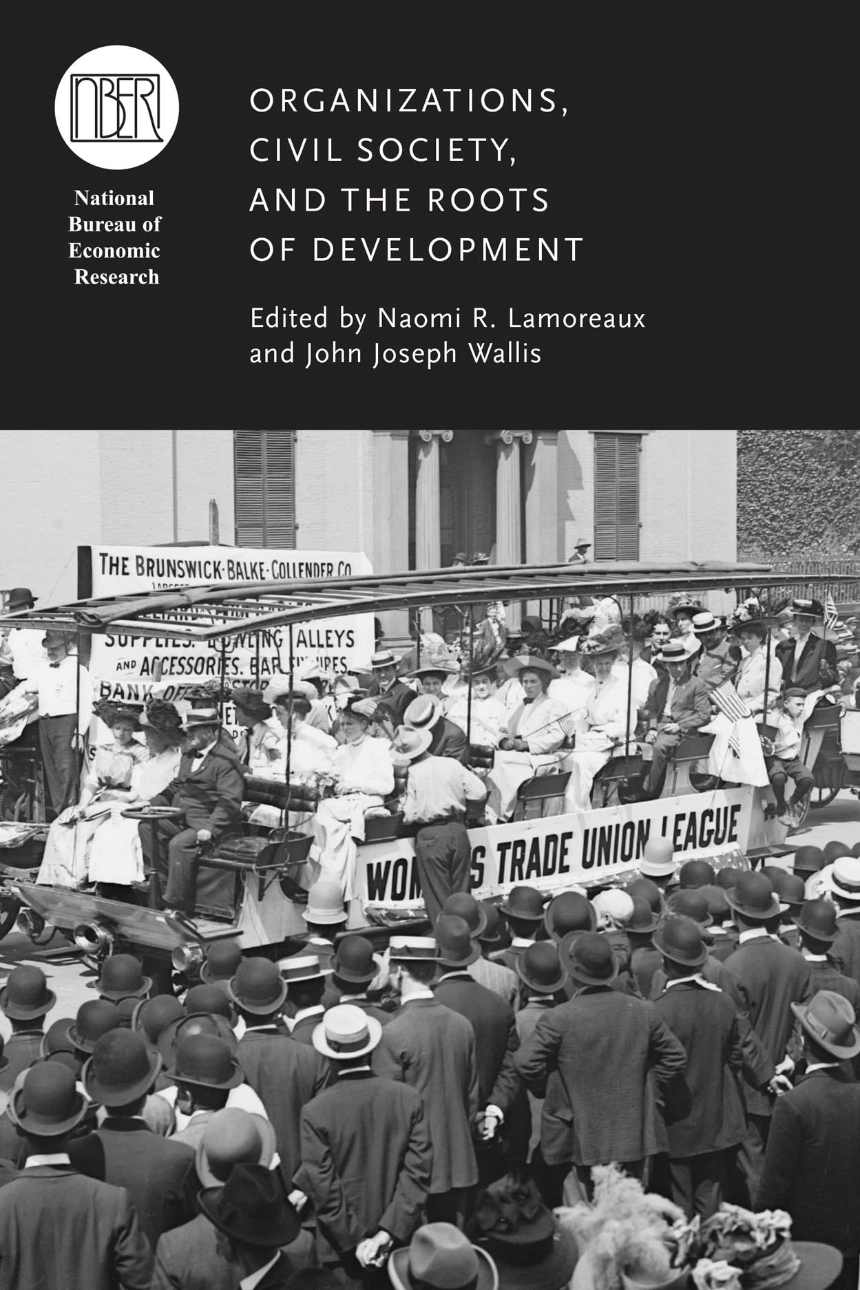Organizations, Civil Society, and the Roots of Development
Modern developed nations are rich and politically stable in part because their citizens are free to form organizations and have access to the relevant legal resources. Yet in spite of the advantages of open access to civil organizations, it is estimated that eighty percent of people live in countries that do not allow unfettered access. Why have some countries disallow the formation of organizations as part of their economic and political system?
The contributions to Organizations, Civil Society, and the Roots of Development seek to answer this question through an exploration of how developing nations throughout the eighteenth and nineteenth centuries, including the United States, United Kingdom, France, and Germany, made the transition to allowing their citizens the right to form organizations. The transition, contributors show, was not an easy one. Neither political changes brought about by revolution nor subsequent economic growth led directly to open access. In fact, initial patterns of change were in the opposite direction, as political coalitions restricted access to specific organizations for the purpose of maintaining political control. Ultimately, however, it became clear that these restrictions threatened the foundation of social and political order. Tracing the path of these modern civil societies, Organizations, Civil Society, and the Roots of Development is an invaluable contribution to all interested in today’s developing countries and the challenges they face in developing this organizational capacity.
The contributions to Organizations, Civil Society, and the Roots of Development seek to answer this question through an exploration of how developing nations throughout the eighteenth and nineteenth centuries, including the United States, United Kingdom, France, and Germany, made the transition to allowing their citizens the right to form organizations. The transition, contributors show, was not an easy one. Neither political changes brought about by revolution nor subsequent economic growth led directly to open access. In fact, initial patterns of change were in the opposite direction, as political coalitions restricted access to specific organizations for the purpose of maintaining political control. Ultimately, however, it became clear that these restrictions threatened the foundation of social and political order. Tracing the path of these modern civil societies, Organizations, Civil Society, and the Roots of Development is an invaluable contribution to all interested in today’s developing countries and the challenges they face in developing this organizational capacity.
448 pages | 4 halftones, 26 line drawings, 21 tables | 6 x 9 | © 2017
National Bureau of Economic Research Conference Report
Economics and Business: Economics--Development, Growth, Planning, Economics--History
Table of Contents
Acknowledgments
Introduction
Naomi R. Lamoreaux and John Joseph Wallis
1. The East Indian Monopoly and the Transition from Limited Access in England, 1600–1813
Dan Bogart
2. Adam Smith’s Theory of Violence and the Political Economics of Development
Barry R. Weingast
3. Pluralism without Privilege? Corps Intermédiaires, Civil Society, and the Art of Association
Jacob T. Levy
4. Banks, Politics, and Political Parties: From Partisan Banking to Open Access in Early Massachusetts
Qian Lu and John Joseph Wallis
5. Corporation Law and the Shift toward Open Access in the Antebellum United States
Eric Hilt
6. Organizational Poisedness and the Transformation of Civic Order in Nineteenth-Century New York City
Victoria Johnson and Walter W. Powell
7. Voluntary Associations, Corporate Rights, and the State: Legal Constraints on the Development of American Civil Society, 1750–1900
Ruth H. Bloch and Naomi R. Lamoreaux
8. The Right to Associate and the Rights of Associations: Civil-Society Organizations in Prussia, 1794–1908
Richard Brooks and Timothy W. Guinnane
9. Opening Access, Ending the Violence Trap: Labor, Business, Government, and the National Labor Relations Act
Margaret Levi, Tania Melo, Barry R. Weingast, and Frances Zlotnick
Contributors
Author Index
Subject Index
Introduction
Naomi R. Lamoreaux and John Joseph Wallis
1. The East Indian Monopoly and the Transition from Limited Access in England, 1600–1813
Dan Bogart
2. Adam Smith’s Theory of Violence and the Political Economics of Development
Barry R. Weingast
3. Pluralism without Privilege? Corps Intermédiaires, Civil Society, and the Art of Association
Jacob T. Levy
4. Banks, Politics, and Political Parties: From Partisan Banking to Open Access in Early Massachusetts
Qian Lu and John Joseph Wallis
5. Corporation Law and the Shift toward Open Access in the Antebellum United States
Eric Hilt
6. Organizational Poisedness and the Transformation of Civic Order in Nineteenth-Century New York City
Victoria Johnson and Walter W. Powell
7. Voluntary Associations, Corporate Rights, and the State: Legal Constraints on the Development of American Civil Society, 1750–1900
Ruth H. Bloch and Naomi R. Lamoreaux
8. The Right to Associate and the Rights of Associations: Civil-Society Organizations in Prussia, 1794–1908
Richard Brooks and Timothy W. Guinnane
9. Opening Access, Ending the Violence Trap: Labor, Business, Government, and the National Labor Relations Act
Margaret Levi, Tania Melo, Barry R. Weingast, and Frances Zlotnick
Contributors
Author Index
Subject Index
